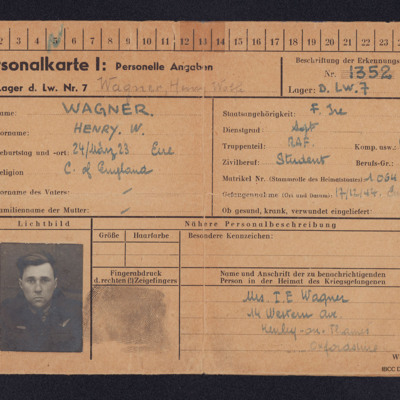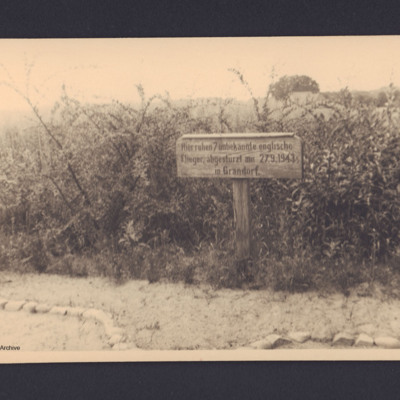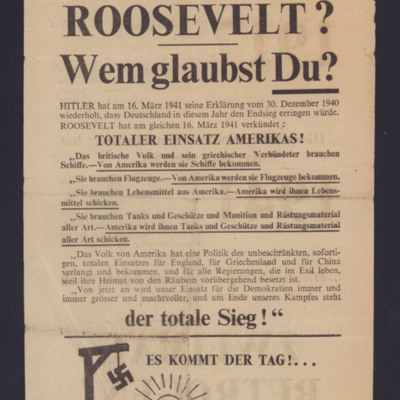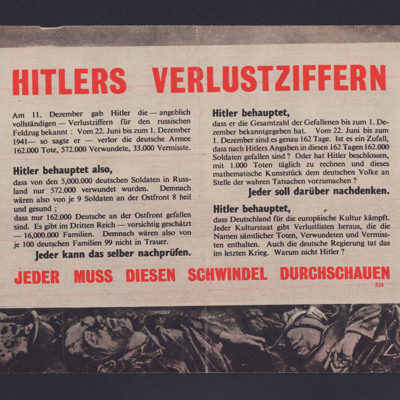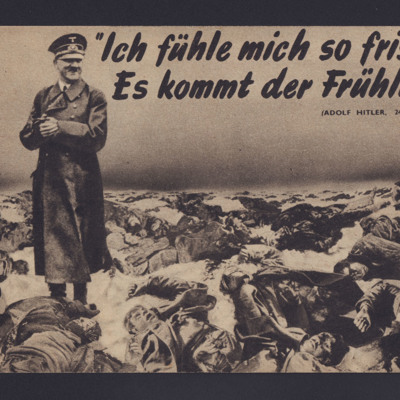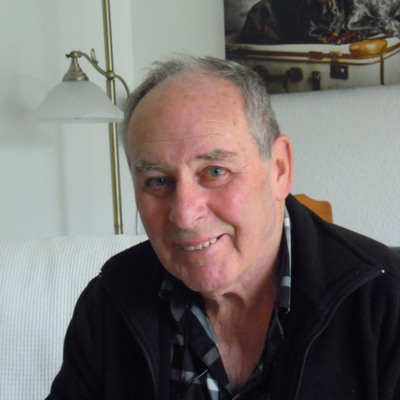Browse Items (270 total)
- Language is exactly "deu"
Sort by:
Henry Wagner's prisoner of war Record Card
Contains very little information other than that entered when initially issued. Has his photograph and a print of one finger.
Tags: aircrew; navigator; prisoner of war
Hier ruhen 7 unbekannte englische Flieger
A wooden sign at the edge of a field in front of a hedge, where 7 airmen crashed on the 27th September 1943 were buried. The sign reads "Hier ruhen 7 unbekannte englische Flieger, abgestürzt am 27.9.1943 in Grandorf".
Hitler oder Roosevelt? Wem glaubst du?
The leaflet contrasts Hitler’s repeated declaration on 16th March 1941 that Germany would achieve the final victory with that of Roosevelt on 16th [15th] March 1941, announcing America’s total commitment until total victory.
A quotation is…
A quotation is…
Hitlers Verlustziffern (Hitler's Casualty Statistics)
Propaganda leaflet aimed at German speaking population.
Page 1 gives some of Hitler's casualty statistics for the Eastern Front and invites Germans to see through the fraud.
Page 2 is an excerpt from the New Year 1941 edition of a Munich newspaper…
Page 1 gives some of Hitler's casualty statistics for the Eastern Front and invites Germans to see through the fraud.
Page 2 is an excerpt from the New Year 1941 edition of a Munich newspaper…
Ich fuhle mich so frisch. Es kommt der Fruhling
Propaganda leaflet aimed at the German population.
Page 1 shows Hitler standing amongst scores of dead German soldiers but smilingly looking forward to Spring on the Eastern Front.
Page 2 is a excerpt from a German Army document describing the 4…
Page 1 shows Hitler standing amongst scores of dead German soldiers but smilingly looking forward to Spring on the Eastern Front.
Page 2 is a excerpt from a German Army document describing the 4…
Interview with Agnes Stocker
Agnes Stocker (b. 1932) recounts her evacuation from her hometown and the journey to Ueckermünde. Agnes tells how she get separated from her sister, her brother and her cousin (who followed the road to Swinemünde), while she, her mother and her…
Interview with Brigitte Terboven
Brigitte Terboven (b. 1930) recalls the bombing of Essen and the dropping of an air mine by a British bomber which was trying to evade a German night fighter. The bomb hit the ground about 20 meters from her home which collapsed like a house of…
Interview with Burckhard Kuck
Burckhard Kuck (b. 1925) tells the story of a 63-year-old mirror, a present from his fellow inmates when he was detained in a prisoner of war camp in England. Emphasises how the object reminds him of the lack of mirrors in the camp and of the fact…
Interview with Charly Pfeifer
Charly Pfeifer recounts his experiences of the bombing of Betzdorf an der Sieg, a small town not far from the Ruhr. He explains the strategic importance of the city, due to the presence of locomotive works. He recounts taking shelter from the bombs…
Interview with Christoph Wagner Brausewetter
Christoph Wagner Brausewetter (b. 1929) recounts the hardships civilians endured inside a shelter, the risks involved and the fact they spent there more time there than at home. Maintains that the worst year was 1943, when aircraft were no longer…
Interview with Dieter Essig
Dieter Essig recollects the 23 February 1945 Pforzheim bombing, which he eyewitnessed at six. Mentions the long hours he spent inside a shelter, describing his wartime years as wasted childhood. Speaks of the 1 April 1944 bombing stressing how he…
Interview with Erika Gautsch
Erika Gautsch (b. 1928) describes her wartime experience of being inside a shelter and the people she met there: an old sick man with his wife, who was incessantly reciting the rosary, and children clinging to their mothers. Emphasises tension and…
Tags: bombing; childhood in wartime; civil defence; faith; fear; home front; shelter
Interview with Eva Brossmer
Eva Brossmer (b. 1925) remembers the incessant bombing of Berlin by the Allied and explains how she and her mother fled to Südharz trying to avoid the advancing Russians. Explains how German broadcasts did not mention their advance and how she heard…
Tags: bombing; home front; strafing
Interview with Günter Lucks
Günter Lucks (b. 1925) describes how he was forced to join the Hitler Youth in 1939, an event that caused a great deal of disturbance in a family of strong communist background. When his parents moved out because of his father’s job as aircraft…
Interview with Gerda Gentner
Gerda Gentner (b. 1934) recalls the first bombing of Dresden on 7 October 1944. Gerda describes how she unsuccessfully tried to persuade a young boy to take shelter with her in the basement and reminisces her feeling when she knew that he had died…
Interview with Gerlinde Keller
Gerlinde Keller (b. 1939) was evacuated in 1942 from Munich to the Altmühltal, where she lived with her aunt in a purpose-built settlement. Explains how the intensifying bombings had made the city unsafe for children and how they managed to cope…
Interview with Gisela Schäfer
Gisela Schäfer (b. 1929) remembers her youth in Eberbach as schoolgirl. Stressed how unlucky she was, having experienced all major bombings in the area. Remembers spending her school holidays as farmhand and emphasises how it was physically…
Interview with Hans-Walter Bendzko
Hans-Walter Bendzko reminisces about his wartime experiences as a young boy in Berlin, before being evacuated. Describes his time at Wannsee, being properly looked after while surviving one of the Berlin bombings. Mentions incendiaries falling into a…
Interview with Heino Dirks
Heino Dirks recounts his younger life in Jever, his experience as a decorator's apprentice in Wilhelmshaven and his service as a firefighter at Jever Airbase. He recollects the crash of a 37 Squadron Wellington R3263 when on duty and his efforts to…
Tags: bombing; crash; firefighting; prisoner of war; Wellington
Interview with Helga Cent-Velden
Helga Cent-Velden (b. 1926) recounts her life in Berlin under constant threat of bombing. Describes how her father tried to locate a suitable air raid shelter for the family and especially how he ruled out the Shell House because of a canal running…
Tags: animal; bombing; civil defence; home front; shelter
Interview with Helmut Köhler
Helmut Köhler (b. 1928) recalls his wartime experience as Luftwaffenhelfer. He provides a first-hand account of two attacks on Kassel, the first on the 22 October 1943 and the second in March 1944. He describes his time spent inside the air-raid…
Interview with Hubert Draegert
Hubert Draegert remembers his wartime experiences, first in Berlin and then as an evacuee at his uncle’s farm near Wroclaw. He mentions the bombing of the Berlin State Opera and the repeated efforts made to rebuild the gutted building. He remembers…
Interview with Inge Heinrich
Inge Heinrich (b. 1922) describes the bombing of the Berlin borough of Kreuzberg and recounts how she had dreamt of being buried alive under the rubble but surviving in the end. Tells of how the patent agency building, in which she was working, was…
Tags: bombing; civil defence; home front
Interview with Ingrid Dennull
Ingrid Dennull reminisces about her wartime experiences in Berlin and then as an evacuee and teacher in East Prussia. She recounts various episodes related to the Dresden attack and its aftermath: seeing from a distance the target indicators, dubbed…

